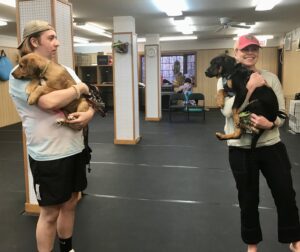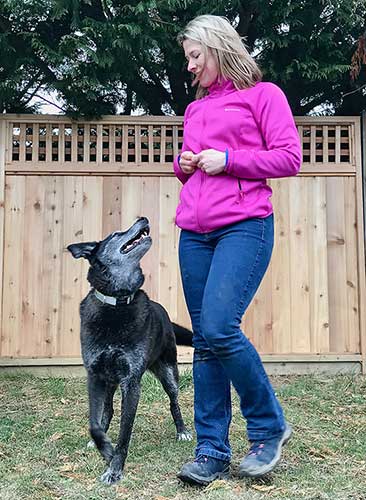 The First Four Months Matter—A Lot
The First Four Months Matter—A Lot
The window for proper puppy socialization is brief but essential. By the time most puppies receive their final round of vaccinations, much of their behavioral development is already set. That’s why the American Veterinary Society for Animal Behavior (AVSAB) recommends joining a well-run puppy class before 16 weeks. Early socialization isn’t just important—it’s crucial.
Socialization is More Than Just Puppy Play
True socialization means exposing your puppy to the world in a positive way. Between 3 and 12 weeks, puppies are like little learning sponges, quickly generalizing new experiences. While individual and breed differences exist, the ability to embrace novelty significantly decreases after 12 weeks. Neutral experiences are fine, but positive ones are best. A lack of exposure during this period cannot be fully corrected later.
Prioritizing Behavioral Health Over Unnecessary Caution
Puppies inherit some immunity from their mothers, and responsible breeders ensure their dams are healthy. However, inherited immunity fades, which is why puppy vaccinations are administered in a series. Waiting until a puppy is fully vaccinated (around 16 weeks) before starting socialization can put their behavioral health at greater risk. Imagine not exposing a young child to the world until age 10—it would significantly hinder their development. The sad reality is that more dogs are re-homed or euthanized due to behavioral issues than those who contract serious illnesses from well-run puppy classes.
Is Your Veterinarian Advising You to Wait? Ask Why.
If your vet suggests delaying socialization until full vaccination, inquire about their reasoning. Are there specific disease outbreaks in your area? If not, refer them to the AVSAB position statement and consider seeking professional guidance from trainers like Mountainside Mutts, who offer safe, structured socialization programs.
What to Look for in a Well-Run Puppy Class
Not all puppy classes are created equal. Look for a program that includes:
- Proof of first-round DAPP vaccination and a negative fecal test
- A structured curriculum incorporating positive exposure to new experiences, foundational training, and supervised puppy play
- A low student-to-instructor ratio for individualized attention
- Modern, humane training methods—no aversive tools like prong, choke, or shock collars
At Mountainside Mutts, we prioritize both physical and behavioral health. Our Puppy Start Right class requires proof of vaccination and a negative fecal test. To further reduce risk, puppies can be carried into our facility, which has a rubberized, disinfected floor that is cleaned before every class. We take health and hygiene seriously.
Controlled Environments Are Safer Than Public Exposure
Dog parks, hardware stores, and sidewalks with heavy dog traffic pose greater health risks than a properly managed puppy class. In fact, many owners only discover their puppies are carrying parasites like Giardia when they request a fecal test for class admission—after unknowingly exposing their dogs to public areas.
Our Facility is Dedicated Solely to Training

Puppy Start Right is all about getting your pup comfortable with new experiences!
Unlike pet stores, public buildings, or even vet clinic waiting rooms, our training space is exclusively for dogs in our programs. No unknown animals enter our disinfected space before class begins, ensuring a clean and controlled environment.
Success Starts with Structure, Management, and Positive Reinforcement
Gone are the days when training was delayed until a dog was physically strong enough to handle outdated, force-based methods. Today’s educated trainers know that early reinforcement-based training is key.
Many behavioral issues in adolescent dogs could have been completely avoided with early socialization and training. If your six-month-old pup is exhibiting behaviors you don’t like, chances are they have been rehearsing those behaviors for months. It’s far easier to prevent problems than to undo them.
Education and Credentials Matter
Would you take medical or legal advice from someone without proper education? The same principle applies to dog training. A professional trainer’s qualifications reflect their commitment to learning and ethical standards.
Look for trainers affiliated with reputable organizations like:
- The Association of Professional Dog Trainers (APDT)
- The Certification Council of Professional Dog Trainers (CCPDT)
- The International Association of Animal Behavior Consultants (IAABC)
- Graduates of Karen Pryor Academy (KPA) or other respected programs
These organizations uphold humane, science-based training standards—where prong, choke, and shock collars are never the first option. Verify a trainer’s credentials yourself—and if they aren’t affiliated with a recognized organization, ask why.
Mountainside Mutts: Setting the Standard in Southern Vermont
At Mountainside Mutts, we are proud of our extensive education and commitment to modern, force-free training. We are Rutland County’s only Certified Canine Behavior Consultant (IAABC)—a credential that requires significant expertise and continuing education.
Why trust your puppy’s future to anything less than the best? Join us for Puppy Start Right and set your dog up for a lifetime of success.



